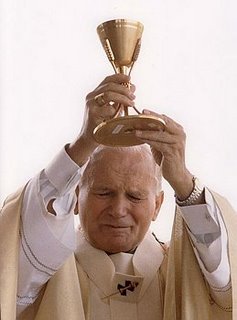 Ecclesia de Eucharistia
Ecclesia de EucharistiaOn the Eucharist in its Relationship to the Church
Pope John Paul II, Encyclical Letter
CHAPTER 1. THE MYSTERY OF FAITH
15. The sacramental re-presentation of Christ's sacrifice, crowned by the resurrection, in the Mass involves a most special presence which – in the words of Paul VI – “is called 'real,' not as a way of excluding all other types of presence as if they were 'not real,' but because it is a presence in the fullest sense: a substantial presence whereby Christ, the God-Man, is wholly and entirely present.” This sets forth once more the perennially valid teaching of the Council of Trent: “the consecration of the bread and wine effects the change of the whole substance of the bread into the substance of the body of Christ our Lord, and of the whole substance of the wine into the substance of his blood. And the holy Catholic Church has fittingly and properly called this change transubstantiation.” Truly the Eucharist is a mysterium fidei, a mystery which surpasses our understanding and can only be received in faith, as is often brought out in the catechesis of the Church Fathers regarding this divine sacrament: “Do not see – Saint Cyril of Jerusalem exhorts – in the bread and wine merely natural elements, because the Lord has expressly said that they are his body and his blood: faith assures you of this, though your senses suggest otherwise.” * * *
17. Through our communion in his body and blood, Christ also grants us his Spirit. Saint Ephrem writes: “He called the bread his living body and he filled it with himself and his Spirit... He who eats it with faith, eats Fire and Spirit... Take and eat this, all of you, and eat with it the Holy Spirit. For it is truly my body and whoever eats it will have eternal life.” The Church implores this divine Gift, the source of every other gift, in the Eucharistic epiclesis. In the Divine Liturgy of Saint John Chrysostom, for example, we find the prayer: “We beseech, implore and beg you: send your Holy Spirit upon us all and upon these gifts... that those who partake of them may be purified in soul, receive the forgiveness of their sins, and share in the Holy Spirit.” And in the Roman Missal the celebrant prays: “grant that we who are nourished by his body and blood may be filled with his Holy Spirit, and become one body, one spirit in Christ.” Thus by the gift of his body and blood, Christ increases within us the gift of his Spirit, already poured out in Baptism and bestowed as a “seal” in the sacrament of Confirmation. * * *
CHAPTER 2. THE EUCHARIST BUILDS THE CHURCH
22. * * * The Church's mission stands in continuity with the mission of Christ: “As the Father has sent me, even so I send you” (Jn 20:21). From the perpetuation of the sacrifice of the Cross and her communion with the body and blood of Christ in the Eucharist, the Church draws the spiritual power needed to carry out her mission. The Eucharist thus appears as both the source and the summit of all evangelization, since its goal is the communion of mankind with Christ and in him with the Father and the Holy Spirit.
No comments:
Post a Comment